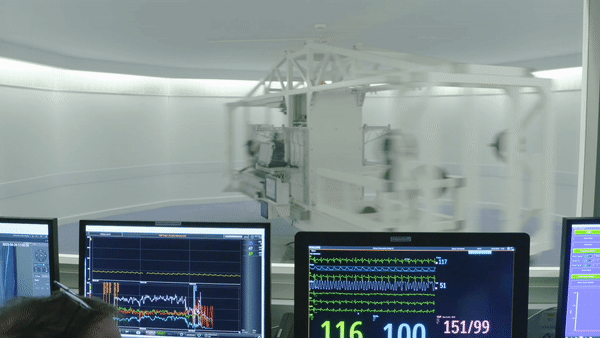Volunteers Are Spending 60 Days in Bed to Help Astronauts Stay Healthy in Space
For two months, the group of 12 men must eat, sleep, exercise, bathe and use the toilet while at least one shoulder is touching the bed
:focal(750x500:751x501)/https://tf-cmsv2-smithsonianmag-media.s3.amazonaws.com/filer_public/c3/0d/c30d53f0-3dec-4c88-8a68-4570a5b70712/medes_prodigima-brace-143_md.jpeg)
While spending time in space, astronauts must be prepared to face an array of challenges, from technical issues with complicated equipment to the psychological stressors of being isolated and far from home.
But spaceflight also takes a toll on their bodies. Research has found astronauts’ weight-bearing bones lose between 1 and 1.5 percent mineral density, on average, for each month they spend without Earth’s gravity. Their muscles shrink, and some of their bodily fluids shift up into their heads, putting pressure on their eyes that can lead to vision problems.
In an effort to combat some of these physical effects, 12 volunteers are spending 60 days lying in bed in a French laboratory. They’re participating in a study called the Bed Rest with Artificial gravity and Cycling Exercise, or BRACE, run by the Institute for Space Medicine and Physiology (MEDES) and supported by the European Space Agency (ESA) and French Space Agency (CNES).
/https://tf-cmsv2-smithsonianmag-media.s3.amazonaws.com/filer_public/e8/39/e8396745-e333-47ec-bc0b-3c8047b3fcbc/brace_bedrest_study_article.jpeg)
But the study in Toulouse, France, isn’t a two-month vacation—far from it. Participants must leave their normal lives behind and spend the entire 60 days reclining in a bed, even when they need to use the toilet, bathe and eat. And there’s another difficult twist: They aren’t lying flat like they do in their beds at home, but rather, they’re titled 6 degrees below horizontal with their heads lower than their feet. This uncomfortable position is meant to simulate the microgravity, or weightlessness, astronauts experience in space.
The study’s participants are healthy men between the ages of 20 and 45, per MEDES. They’re all non-smokers who are in good physical shape and have a stable state of mental health, as determined by a series of psychological interviews and tests. Their BMIs are between 20 and 27, and they’re between roughly 5 and 6 feet tall (158 to 190 centimeters).
Researchers divided the men into three groups. Four individuals are serving as the control group by simply lying in bed for the full 60 days. Another four are lying in bed but also exercising regularly with a cycling machine they can use from their reclined position. And the final four are lying in bed and periodically using the cycling machine while spinning around in a centrifuge device meant to simulate artificial gravity.

All of the participants must keep at least one shoulder on the bed at all times and, for their efforts, they’ll receive about $19,300 (€18,000) in payments spread over four years, per MEDES. (If you missed out this time around and want to participate in a similar study in the future, MEDES says it will recruit more volunteers this fall for another experiment slated for early 2024.)
Scientists conducted an array of physiological tests before the men began resting, including those designed to measure their neurological, cardiovascular, metabolic, muscular and bone health; they also conducted additional standard tests—such as urinary, blood, opthalmological and psychological evaluations—that have been part of all European bedrest studies for at least the last ten years, according to MEDES. Researchers will repeat all the measurements after the 60 days are up, then the participants will return for follow-up visits after another 30 days, one year and two years past the experiment.
Astronauts already spend at least two hours per day exercising while they’re in space, but with this study, scientists hope to understand the effects of exercising under artificial gravity conditions. Since it acts on all of the body’s organs at once, artificial gravity could become “an effective solution for a healthier body during long-duration space missions, if the technological challenges can be overcome,” says Angelique Van Ombergen, a life sciences researcher with the European Space Agency (ESA), in a statement.
Bedrest studies like this one are relatively common—the ESA has been conducting them since 2001—but this is the first time such an experiment in Europe has included cycling. In addition to keeping astronauts healthy in space, the findings could have useful applications for people on Earth, too, such as elderly individuals, bedridden patients or people with musculoskeletal conditions and osteoporosis, Van Ombergen says in the statement.
“Rehabilitation after surgery or serious illness can mean weeks spent recuperating in bed,” per the ESA. “The research done on bedrest volunteers directly applies to these situations and is shared freely with scientists in all disciplines.”
/https://tf-cmsv2-smithsonianmag-media.s3.amazonaws.com/accounts/headshot/SarahKuta.png)
/https://tf-cmsv2-smithsonianmag-media.s3.amazonaws.com/accounts/headshot/SarahKuta.png)